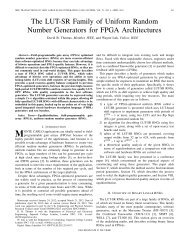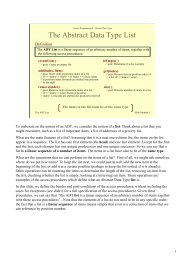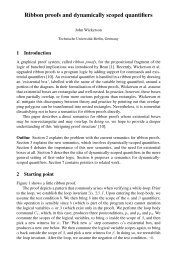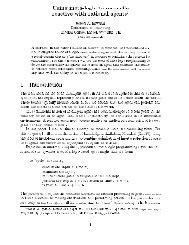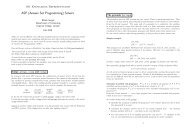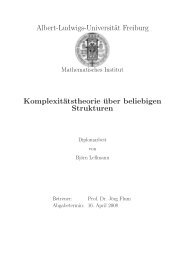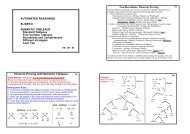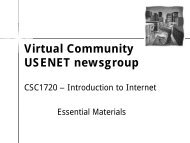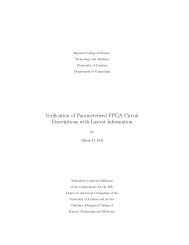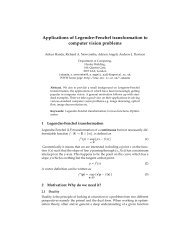A Survey of Monte Carlo Tree Search Methods - Department of ...
A Survey of Monte Carlo Tree Search Methods - Department of ...
A Survey of Monte Carlo Tree Search Methods - Department of ...
Create successful ePaper yourself
Turn your PDF publications into a flip-book with our unique Google optimized e-Paper software.
IEEE TRANSACTIONS ON COMPUTATIONAL INTELLIGENCE AND AI IN GAMES, VOL. 4, NO. 1, MARCH 2012 2<br />
according to some default policy, which in the simplest<br />
case is to make uniform random moves. A great benefit<br />
<strong>of</strong> MCTS is that the values <strong>of</strong> intermediate states do<br />
not have to be evaluated, as for depth-limited minimax<br />
search, which greatly reduces the amount <strong>of</strong> domain<br />
knowledge required. Only the value <strong>of</strong> the terminal state<br />
at the end <strong>of</strong> each simulation is required.<br />
While the basic algorithm (3.1) has proved effective<br />
for a wide range <strong>of</strong> problems, the full benefit <strong>of</strong> MCTS<br />
is typically not realised until this basic algorithm is<br />
adapted to suit the domain at hand. The thrust <strong>of</strong> a good<br />
deal <strong>of</strong> MCTS research is to determine those variations<br />
and enhancements best suited to each given situation,<br />
and to understand how enhancements from one domain<br />
may be used more widely.<br />
1.2 Importance<br />
<strong>Monte</strong> <strong>Carlo</strong> methods have a long history within numerical<br />
algorithms and have also had significant success<br />
in various AI game playing algorithms, particularly imperfect<br />
information games such as Scrabble and Bridge.<br />
However, it is really the success in computer Go, through<br />
the recursive application <strong>of</strong> <strong>Monte</strong> <strong>Carlo</strong> methods during<br />
the tree-building process, which has been responsible<br />
for much <strong>of</strong> the interest in MCTS. This is because Go<br />
is one <strong>of</strong> the few classic games for which human players<br />
are so far ahead <strong>of</strong> computer players. MCTS has had<br />
a dramatic effect on narrowing this gap, and is now<br />
competitive with the very best human players on small<br />
boards, though MCTS falls far short <strong>of</strong> their level on the<br />
standard 19×19 board. Go is a hard game for computers<br />
to play: it has a high branching factor, a deep tree, and<br />
lacks any known reliable heuristic value function for<br />
non-terminal board positions.<br />
Over the last few years, MCTS has also achieved great<br />
success with many specific games, general games, and<br />
complex real-world planning, optimisation and control<br />
problems, and looks set to become an important part <strong>of</strong><br />
the AI researcher’s toolkit. It can provide an agent with<br />
some decision making capacity with very little domainspecific<br />
knowledge, and its selective sampling approach<br />
may provide insights into how other algorithms could<br />
be hybridised and potentially improved. Over the next<br />
decade we expect to see MCTS become a greater focus<br />
for increasing numbers <strong>of</strong> researchers, and to see it<br />
adopted as part <strong>of</strong> the solution to a great many problems<br />
in a variety <strong>of</strong> domains.<br />
1.3 Aim<br />
This paper is a comprehensive survey <strong>of</strong> known MCTS<br />
research at the time <strong>of</strong> writing (October 2011). This<br />
includes the underlying mathematics behind MCTS, the<br />
algorithm itself, its variations and enhancements, and<br />
its performance in a variety <strong>of</strong> domains. We attempt to<br />
convey the depth and breadth <strong>of</strong> MCTS research and<br />
its exciting potential for future development, and bring<br />
together common themes that have emerged.<br />
This paper supplements the previous major survey in<br />
the field [170] by looking beyond MCTS for computer<br />
Go to the full range <strong>of</strong> domains to which it has now<br />
been applied. Hence we aim to improve the reader’s<br />
understanding <strong>of</strong> how MCTS can be applied to new<br />
research questions and problem domains.<br />
1.4 Structure<br />
The remainder <strong>of</strong> this paper is organised as follows.<br />
In Section 2, we present central concepts <strong>of</strong> AI and<br />
games, introducing notation and terminology that set<br />
the stage for MCTS. In Section 3, the MCTS algorithm<br />
and its key components are described in detail. Section<br />
4 summarises the main variations that have been<br />
proposed. Section 5 considers enhancements to the tree<br />
policy, used to navigate and construct the search tree.<br />
Section 6 considers other enhancements, particularly to<br />
simulation and backpropagation steps. Section 7 surveys<br />
the key applications to which MCTS has been applied,<br />
both in games and in other domains. In Section 8, we<br />
summarise the paper to give a snapshot <strong>of</strong> the state <strong>of</strong><br />
the art in MCTS research, the strengths and weaknesses<br />
<strong>of</strong> the approach, and open questions for future research.<br />
The paper concludes with two tables that summarise the<br />
many variations and enhancements <strong>of</strong> MCTS and the<br />
domains to which they have been applied.<br />
The References section contains a list <strong>of</strong> known MCTSrelated<br />
publications, including book chapters, journal<br />
papers, conference and workshop proceedings, technical<br />
reports and theses. We do not guarantee that all cited<br />
works have been peer-reviewed or pr<strong>of</strong>essionally recognised,<br />
but have erred on the side <strong>of</strong> inclusion so that the<br />
coverage <strong>of</strong> material is as comprehensive as possible. We<br />
identify almost 250 publications from the last five years<br />
<strong>of</strong> MCTS research. 3<br />
We present a brief Table <strong>of</strong> Contents due to the<br />
breadth <strong>of</strong> material covered:<br />
1 Introduction<br />
Overview; Importance; Aim; Structure<br />
2 Background<br />
2.1 Decision Theory: MDPs; POMDPs<br />
2.2 Game Theory: Combinatorial Games; AI in Games<br />
2.3 <strong>Monte</strong> <strong>Carlo</strong> <strong>Methods</strong><br />
2.4 Bandit-Based <strong>Methods</strong>: Regret; UCB<br />
3 <strong>Monte</strong> <strong>Carlo</strong> <strong>Tree</strong> <strong>Search</strong><br />
3.1 Algorithm<br />
3.2 Development<br />
3.3 UCT: Algorithm; Convergence to Minimax<br />
3.4 Characteristics: Aheuristic; Anytime; Asymmetric<br />
3.5 Comparison with Other Algorithms<br />
3.6 Terminology<br />
3. One paper per week indicates the high level <strong>of</strong> research interest.



